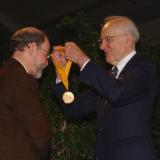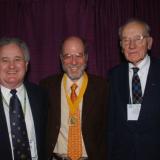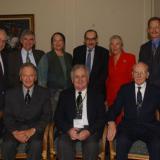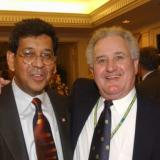2002 Gruber Genetics Prize
A geneticist, developmental biologist, and neurobiologist, Professor H. Robert Horvitz found that cell death is an active biological process involving a specific set of genes. His discoveries are Important to our understanding of major human ailments such as cancer and autoimmune and degenerative diseases.
2002 Genetics Prize Recipient
Laureate Profile
H. Robert Horvitz is a neurobiologist, developmental biologist, and geneticist. Working with the nematode worm C elegans, he identified genes responsible for programmed cell death.
He defined genes that control specific aspects of cell lineage and cell fate, including the generation of cell diversity during development; the timing of particular developmental events; inter- and intracellular signaling; and programmed cell death.
Horvitz's molecular analyses of these genes revealed most of them to be strikingly similar to genes found in other organisms, including humans.
His discoveries have profound implications for both understanding and treating human diseases such as cancer and neural degeneration.
One specific major discovery made by Horvitz during his studies of nematode cell lineage is the finding that cell death is an active biological process involving a specific set of genes.
He found that those genes function within cells that die to bring about their deaths and defined a genetic pathway that constitutes the genetic "program" for programmed cell death. These findings established a pathway for programmed cell death that appears to be conserved from nematode to human and that is important for many aspects of animal biology.
His discoveries are of particular relevance for our understanding of major human ailments such as cancer, autoimmune and degenerative diseases.
Citation
Robert Horvitz, Professor of Biology, Massachusetts Institute of Technology, has been relentless in his use of genetic tools to reveal and dissect mechanisms of human development and behavior. In particular, he defined genetic pathways that are responsible for programmed cell death (apoptosis), a natural process that determines whether cells live or die. His discoveries have profound implications for both understanding and treating human diseases such as cancer and neural degeneration.







































